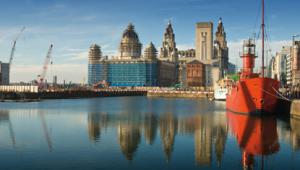The Northern Powerhouse is all about the belief that the economies of a cluster of neighbouring cities can be catalysed to become greater than the sum total of their constituent parts.
The obvious way to implement this 'agglomeration theory' is to improve transport connectivity between them.
As a concept, it now represents one of the biggest area of overlap in British politics.
I might have despaired at George Osborne's austerity agenda while he was chancellor, but readily endorse his analysis and commitment to the concepts underpinning the Northern Powerhouse.
It’s a pity he didn't deliver more of it when he was at the Treasury, of course. But that's another matter.
Political ideas are never new and it’s easy to find myself in agreement with Osborne as it's pretty much the same case John Prescott made with his 'Northern Way' initiative fifteen years ago, which planned to connect-up our northern cities.
And that was similar to arguments Michael Heseltine has long made, most recently in his 'No Stone Unturned’ paper for the Coalition government five years ago, which recommended devolving £80bn of public spending to the regions.
So the problem is not one of political agreement. We have that in spades. Everyone now accepts devolution to spur on regional growth is a ‘good thing.’
It's ensuring that rhetoric transforms into hard cash and we deliver a step-change in transport improvements that serves to underpin new growth across the northern economy.
Transport secretary Chris Grayling recently claimed that it's a matter for the north to 'take control' and find a solution.
But responsibility without money is like being give an electric kettle without a plug. Give us the funding to make a sustainable difference and we can – and will - fix our transport problems.
Unfortunately, the minister’s form leaves a lot to be desired.
Investing in the north's connectivity is a national issue and should be seen as such.
During the summer, he cancelled a series of rail electrification projects in the north of England and elsewhere, while, at the same time, the Crossrail 2 line in London received the green light. The irony appeared lost on him. By all means let’s improve London's connectivity, but allow the north of England the same chance.
Northern political leaders, as well as the business community, are united in our analysis and we are clear where the bar is set. We need better passenger and freight rail services – including HS3 so that we can reduce journey times and increase capacity between the key cities of Liverpool, Manchester, Leeds, Sheffield, Newcastle and Nottingham.
As an illustration of the problem, the rail line from Liverpool to Manchester – the first in the world – still sees journey times that Victorian passengers would recognise. An onward car journey to Sheffield – about the same distance – involves travelling over one of two winding, single-lane passes through the Peak District, where lorries take tight bends at 10 mph.
What current ministers need to realise is that we all want the same things. There is no party political advantage to be had. If we fail to deliver change, then they fail too. London is left overheating and the North's economic potential is unrealised.
But if we succeed in making a step-change in transport connectivity between the great northern cities, easing congestion, increasing capacity and reducing journey times, then ministers succeed when it comes to the Holy Grail of rebalancing the national economy and developing a much-needed counterweight to London and the south-east.
So this is not a case of special pleading.
Nor should it ever be seen as a 'north versus south' issue.
Investing in the north's connectivity is a national issue and should be seen as such. It's about making the national economy perform better. Delivering more growth. Creating a more resilient model. Delivering more jobs and opportunity. For everyone – in all corners of this country.
The message is simple: If the north of England succeeds economically, then so does the rest of the UK.



















